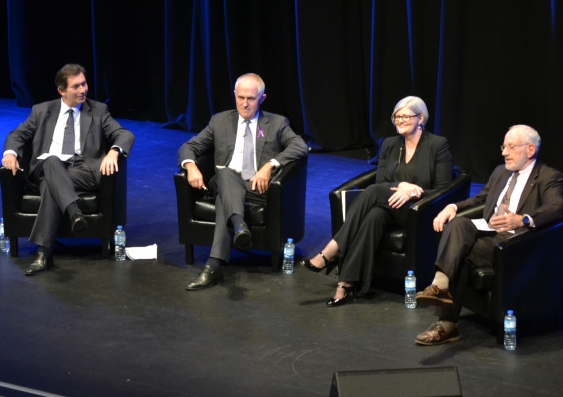Embracing risk for a better future
We are living through "the most excitingly disruptive time", says Communications Minister Malcolm Turnbull, and we must view it as an opportunity if the nation is to prosper.
We are living through "the most excitingly disruptive time", says Communications Minister Malcolm Turnbull, and we must view it as an opportunity if the nation is to prosper.

Deborah Smith
UNSW Media
9385 7307 or 0478 492 060
deborah.smith@unsw.edu.au
Australia needs to view uncertainty as an opportunity, rather than feel threated by it, if the nation is to prosper in a rapidly transforming world, the Minister for Communications Malcolm Turnbull has told a public forum at UNSW on managing risk in life, politics, business, climate change and medicine.
“This is the most excitingly disruptive time to be alive. We have never had so much uncertainty in our economic and geopolitical environment – driven, in large measure, by the rapidity of technological change,” Mr Turnbull said.
“We cannot run away from risk. Embracing volatility and flexibility is critically important because that is how you manage risk. We have to be smarter, more competitive, more productive, more technologically sophisticated and better informed by science.”
Mr Turnbull was one of four speakers at the Risky Business Panel Discussion and Q&A hosted last night by UNSW Science, with leading ABC science journalist Robyn Williams as MC.
UNSW Vice-Chancellor Professor Ian Jacobs, businesswoman Sam Mostyn, and distinguished geophysicist Professor Herbert Huppert of UNSW and the University of Cambridge also engaged in a wide-ranging conversation and debate with the audience of more than 500.
Topics covered were as diverse as actress Angelina Jolie’s recent ovarian surgery, border protection and terrorism, bias in the media, fossil fuel divestment by universities, housing shortages in Sydney, new data retention laws and Australia’s contribution to carbon dioxide emissions.
Professor Jacobs said that new medical technologies such as genetic testing for cancer could be of great benefit to patients. But they also meant patients and doctors had the extremely difficult task of weighing up the risks and benefits of different treatments and preventative strategies, such as the removal of breasts and ovaries.
“Dealing with that sort of information is massively challenging,” he said.
He also said increased investment in university research was needed to drive the discovery pipeline that could help Australia move beyond a minerals-based economy.
“One of the risks for Australia is that we don’t get right the connection between government, industry and our universities,” Professor Jacobs said.
Professor Huppert said if emissions of greenhouse gases continued at the current rate it would lead to “irrevocable trouble in 20 or 30 years”.
Ms Mostyn said the insurance industry became aware early on of the risks posed by climate change and realised it had to enter the debate and collaborate with scientists.
Risk should not be feared, but seen as an opportunity to develop resilient businesses, organisations, communities and families, said Ms Mostyn, who is President of the Australian Council for International Development: “We’re only going to solve the big risk issues if we take a resilience focus, if we engage with people we haven’t yet spoken to.”
People from different cultural and educational backgrounds and scientific disciplines needed to be included more in discussions. “And women must be at the table where decisions are made,” she said.
Rather than adopting this approach, “we’ve gone back to a lot of silo-based thinking and hiding from risk,” she said.